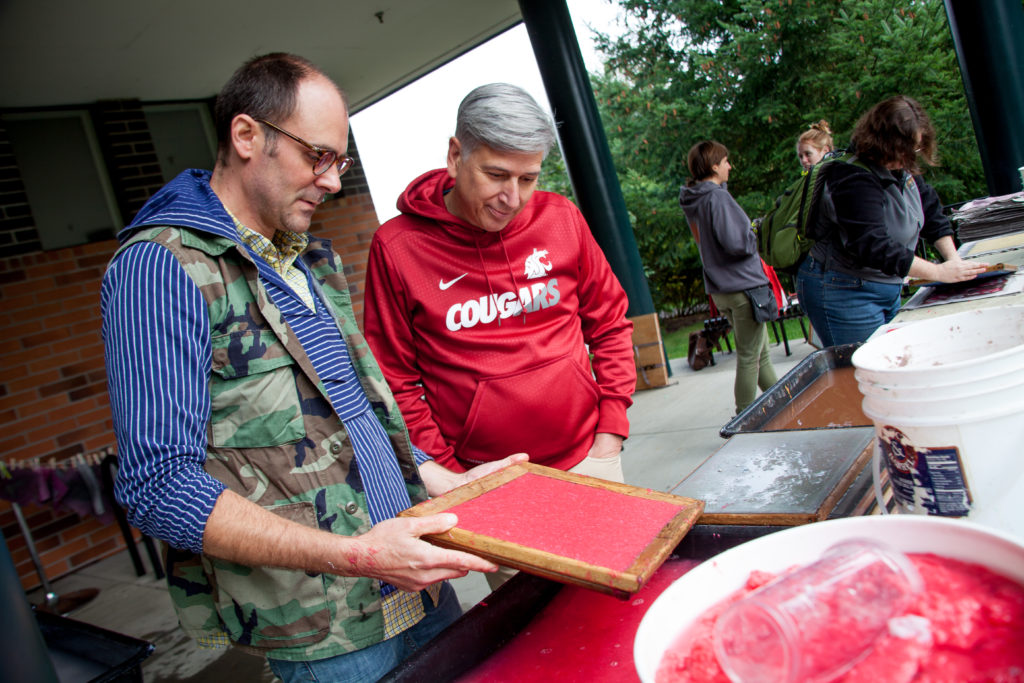Twenty-one years ago Drew Matott first learned about the paper making process when he transformed his late father’s clothing into paper for his poems and photos. Matott said at first, paper making was a family activity but since has evolved to include students, refugees and survivors of war and terrorism across the globe. Now the director of the Peace Paper Project, Matott has taught paper making to over 30,000 people around the world. The project came to WSU Vancouver on Oct. 9.

(Sydnie Kobza/The VanCougar)
Matott described the Peace Paper Project as an international organization of fine artists, including papermakers, art therapist and social activists.
Matott added that the project is a form of social engagement and art therapy. The project is known to be used to help members of the community heal and address specific issues they may have. The project has thousands of workshop participants and has launched 40 paper making programs in different countries including Australia, India, Turkey, Iran, Ukraine and Poland according to the Peace Paper Project website.
“For me, the Peace Paper Project is a force of using hand paper making as a form of healing to help different populations and different groups address specific issues in their communities,” Matott said.
Matott’s decision to bring the Peace Paper Project to Vancouver was influenced by his past relationship with WSU Vancouver Chancellor Mel Netzhammer.
“[Netzhammer] was the Dean of the College of Arts and Humanities at Buffalo State [State University of New York], when I was an undergraduate… He was one of the big people in my life” Matott said.
For the last three years, Matott and artist Jana Schumacher worked at the Peace Paper Project headquarters in Hamburg, Germany. There, Matott and Schumacher continue to work with migrants to transform their clothing (clothing worn as they escaped from their home country) to paper, as a way of reflecting on their past.

According to Matott, The Peace Paper Project was active in Ukraine, where they helped veterans from the civil war. They did so by teaching them how to build their own machines. The veterans were able to use the process as a platform to speak about their traumas. This allowed the community to embrace the war veterans.
Matott spent three weeks working with women in the Kalwa slum, a region of the city of Mumbai in India where they manufacture paper to wrap soap. They invested $200 to assist with training. This helped locals to craft their own paper faster.
“When we went to Mumbai they were making 10 sheets a day. They get paid by the amount of paper they make. When we left, they were making 200 sheets a day,” Matott said.
WSU Vancouver computer science major, Gabriel, who asked that only his first name be used for this story, took part in the project on Oct. 11 outside of the Firstenburg Student Commons. Using old clothes made of cotton fiber to create his project, Gabriel said his inspiration came from working with diverse textures.
“It’s really interesting to have a whole different type of fiber to print on, because it makes everything feel different,” he said, “A little more organic. So I was just drawn to it.”

(Sydnie Kobza/The VanCougar)
Gabriel used his time at the Peace Paper Project to aid him in a personal project.
“Mostly, I’m just trying to make as much variation in color that I can for an upcoming printmaking project,” Gabriel said. He explained that he produces self-published magazines, or “zines” as he called them, which center around counter-culture and art.
According to Gabriel, he began his project approximately four years ago while traveling to unique music performances. Some of the distinctive genres included “noise music” and punk rock.
Gabriel said, “Twenty years down the line somebody might say, ‘Hey this is really awesome, they still have this’” when they happen upon a peice of work they have created in the past.
The Peace Paper Project will continue to visit universities in the Washington state area, set to stop at WSU Tri-Cities later in October.
